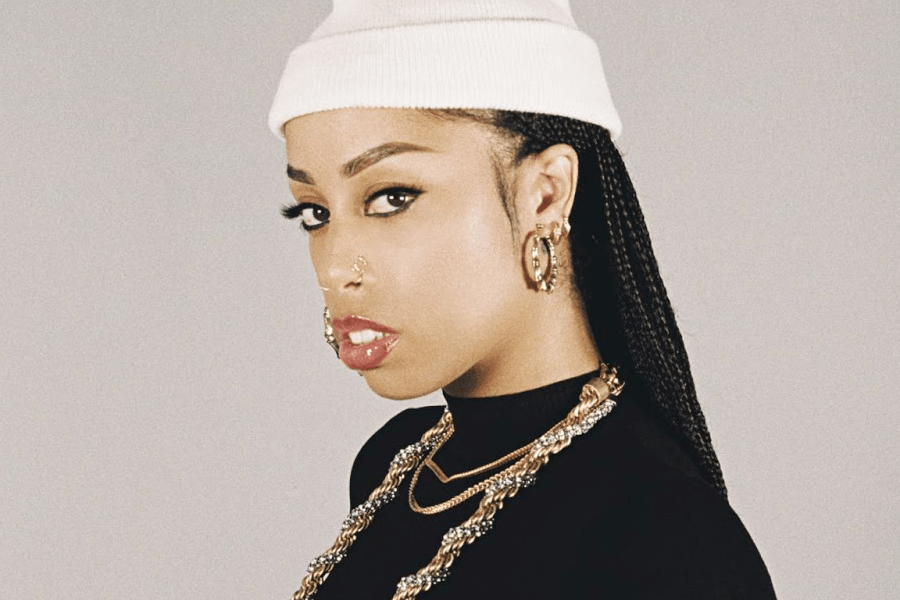

We need something to look forward to right now. A life that’s more open, with loud music and dancefloors, seems like it’s on the horizon – and Rochelle Jordan is ready with the bangers.
In fact, she’s releasing her best album yet on April 30, Play With The Changes (Royal Mountain), a collection of 12 songs that beautifully merge off-kilter UK garage rhythms with Toronto’s hard-hitting R&B minimalism and sultry pop melodies.
“It’s been a sad time, but there’s a future ahead of us,” she says over the phone from Los Angeles. “Let’s try to reflect on the possibilities of all the good things to come. I hope my music can help define people moving forward after what’s been such a crucial time.”
Born to British-Jamaican parents in the UK, raised in Whitby and now living in Los Angeles, Jordan describes her life as “a stream from a lot of different places,” and so music has become a way to “bridge certain things and fall into different dynamics of myself.”
Talking about Play With The Changes, she sounds hyped up and ready. It follows a quiet period of sporadic collaborations after a string of buzzy indie releases aligned her with the “Toronto Sound” that defined mainstream R&B in the years before she started work on the album in 2015. The record was 85 per cent done when the pandemic hit, and she spent the past year mixing and adding finishing touches with genre-bending producers KLSH, Machinedrum and Jimmy Edgar.
“I had a moment of silence during the creation of this project, not necessarily listening so deeply to everything that was current,” she explains. “I really wanted to reach back into my memory and pull from sounds and artists that I loved growing up.”
Her brother is 10 years older, and when her family moved to the GTA from the UK he brought a tranche of records – jungle, drum n’ bass, gospel house – from the era when British club music was mixing big melodies with irregular rhythms. Jordan came of age with those sounds and late-90s/early-00s pop, and she doesn’t shy away from the influence, calling Whitney Houston, Celine Dion and Mariah Carey “the holy trinity of vocals.”
“My ear has always gravitated towards women who have very strong, soulful voices, but who can also sound very delicate and soft at the same time.”
That duality is all over the album, musically and thematically in songs that seamlessly skip from high anxiety to hard-fought confidence. Jordan’s musical education was formal, but unofficial. After a breakup at age 19, her mom suggested she stay with cousins in Brampton, one of whom was studying music at Humber College.
“I just went with him to school every day,” she says. “I would be in the theatre listening to orchestras and just really absorbing all these artists who were actually pursuing music for real. That really clicked for me.”
That led to hanging out on Queen West and going to clubs to see artists like drummer Larnell Lewis. She networked with support from promoter-turned-musician Tika Simone (aka TiKA), connecting with longtime collaborator KLSH. Moving to Los Angeles was a chance to break free and develop, connect and collaborate (she’s toured with Jessie Ware and songwritten for Childish Gambino). These were formative experiences she poured into Play With The Changes.
Jordan’s vocals might seem more restrained compared with her showy music idols, but she exists in a similar space between strength and softness. Songs like Broken Steel are full of porous runs, while her wordplay keeps up with the breakneck rhythms on ravey jam Got Em. On the housey, empowering Already, she spits bars about breaking out of bad relationship patterns – personal and professional – and thriving.
Over the snappy All Along’s peaks and valleys, she’s searching for something – exactly what changed as the song revealed itself.
“A lot of songs that I’ve made, sometimes I’ll wrap them up in a love interest,” she explains. “But there’s definitely an inner soul that’s reflecting on something else I’m probably thinking about.”
On Lay, she sings from a place of anxiety – of watching a Black partner, brother or friend walk out the door and worrying whether they will return, a feeling she says intensified after moving to the U.S.
“There’s so many ways that you can go about speaking to the injustices of this world,” she explains. “I felt the need to come at this from a place where I could at least try to get the listener to empathize. It’s important to speak on how [racism] actually affects the psyche.
“Any effort to tell these stories or to hold people accountable to make the world a better place, and to have other people understand the plight of Black people,” she adds. “I was called to just pull from the place of hoping that people will relate to the emotion of this fear.”
Where does she get the resolve to pursue music as an indie artist in an increasingly difficult economic climate? By focusing on friends, family and collaborators supporting her endeavour. But also something else.
“You need to have a certain level of delusion to be an artist because you literally cannot think about all those things,” she says. “I just keep my mind on the fact that I know I’m called to do this and there’s probably a greater purpose that’s bigger than me.”
Play With The Changes was possible, she says, because of spiritual awakenings and a shift in her mindset.
“I was starting to understand things from a higher frequency,” she says. “It came from me reflecting on the positivity of what change could be, as painful as it can be – change is never comfortable, but it’s also your perspective.”












